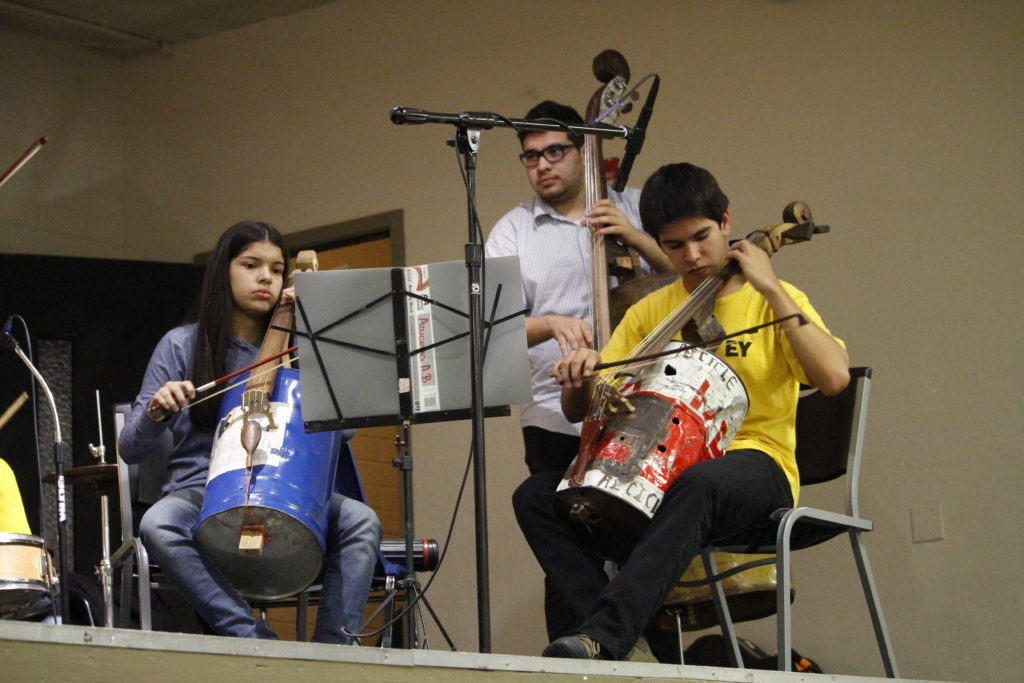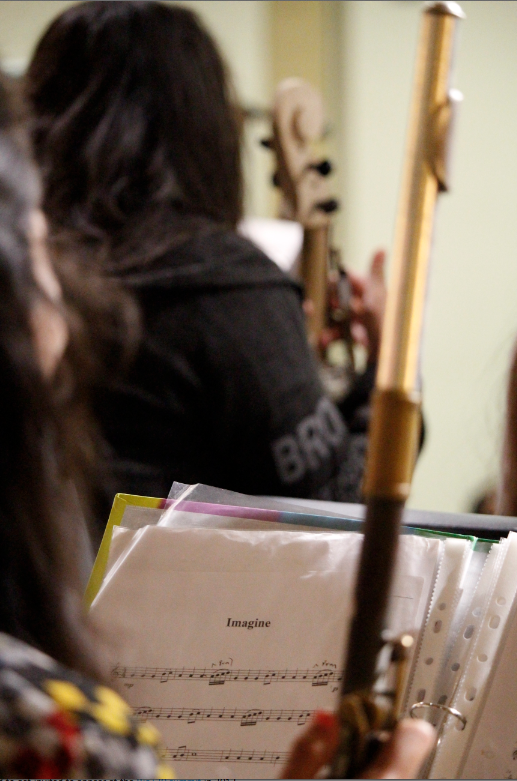

SCOTTSDALE — Alas, the older generation can rightly claim that what they’re hearing is garbage. But they’ll have to distinguish between the physical instruments and the sound coming out of them.
That’s what a church hall full of Catholics and a busload of inner city students did during a documentary screening Nov. 6 at St. Daniel the Prophet in Scottsdale followed by a live performance featuring the same musicians and their instruments. “Landfill Harmonic” is a film set for release next spring that follows the Recycled Orchestra of Cateura, a Paraguayan youth orchestra.

Their unlikely choice of instruments — pieces welded together from objects found in the nearby landfill — was part necessity and part strategy. Acquiring traditional instruments in the poor city was an expensive endeavor that would also encourage larceny.
The nearby landfill offered 1,500 tons each day of material to scavenge. Between the ingenuity of Favio Chávez, the teacher/conductor — who was originally sent to Paraguay to help families identify and sell recyclables — and “Don Cola,” a neighborhood elder, they realized large oil cans could be drums, metal forks could hold a violin’s strings in place and a shower head could serve as a trumpet’s horn. Even a wooden spoon and heel of a woman’s shoe had newfound purpose in the orchestra.
The musicians found themselves transformed too. It had been hard for youth to dream. The universal language of music individually spoke to them. They began to aspire to personal and professional greatness and look beyond obstacles a doctor or parent threw their way.
The first full orchestra sound audiences hear conveys a well-known but unidentified tune played by both Beethoven and local Catholic churches. Either version has a title or lyrical message meant more for its musicians.
It sets the tone for the effect the Recycled Orchestra has on its members, are ages 10 and older. It’s one of several moments of divine providence discovered during filming, according to Juliana Penaranda-Loftus, a Scottsdale Catholic who produced and co-directed the film.
“There are particular moments of the film that forecasts what’s going to happen to them later,” Penaranda-Loftus said.
She noted Chávez’s pep talk prior to the first international performance by the student musicians. They managed to get invited to appear at the Rio+20 summit in 2012.
Chávez tells the youth, “We are not famous people,” but ensured their musical and emotional preparation challenged them as such nonetheless. A simple YouTube video, an encounter with an American heavy metal band and the local Arizona and national news circuit took care of the rest.
“In my heart, something told me that they were going to be famous,” Penaranda-Loftus told The Catholic Sun after the film screening.
She began filming the orchestra five years ago. She had wanted to create a documentary with a social message. Once she encountered Alejandra Amarailla, founder and executive producer who is from Paraguay but living in Arizona, Penaranda-Loftus knew it was a worthy partnership.
“It shows the importance and the power of educating communities,” she told The Catholic Sun. “It’s a film of empowerment.”
One elderly woman was so moved after the pre-release screening, she insisted a DVD copy and possibly CDs featuring the Recycled Orchestra. A few youth asked the director questions, including one young boy who wanted to join.
A bilingual crowd eagerly listened to the 24-member orchestra give a short educational concert. “My Way,” the first selection, also featured a first-ever solo by 10-year-old Cynthia, who was among several members out of her native Paraguay for the first time.
Danielle Martinez, a St. Daniel parishioner, was among three generations from her family at the film screening and concert. She loved the story and wanted to show her 7 and 10-year-old that American children often have an easy life compared to other countries.
Her husband, David, left with a reminder to take little stresses of the day in stride. Orchestra members did the same thing throughout the film, even when disaster struck.
“To have nothing is not an excuse to do nothing,” the orchestra’s director said in the film. He told concertgoers in the film that culture is a basic human need.
Fr. Thaddeus McGuire, pastor of St. Daniel, agreed. That’s why he was eager to support the film and the orchestra. It dates to an old church tradition of being patrons of the arts by supporting scholas, painters and the buildings of churches if one had the means, he said. It was also important to invite students.
“Youth in particular can be inspired to greater endeavors,” Fr. McGuire said. “The beauty that we experience in the fine arts is a reflection of the ultimate beauty: of God.”





